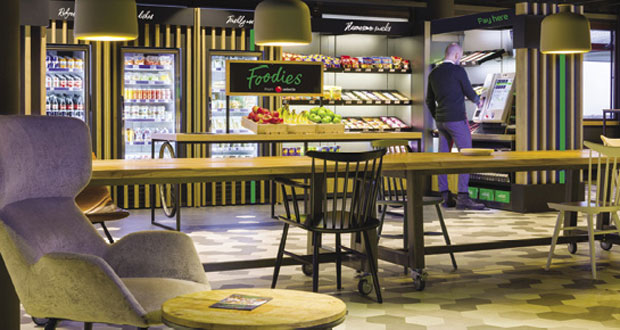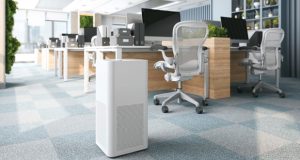 As workplaces open up this Autumn, Paul Hearne, Managing Director, Selecta UK & Ireland offers an up-to-date guide on the technology transforming workplace catering
As workplaces open up this Autumn, Paul Hearne, Managing Director, Selecta UK & Ireland offers an up-to-date guide on the technology transforming workplace catering
In a world dominated by smart technology, the Internet of Things and automation, it’s not surprising catering businesses are embracing new technology to develop their processes and become more competitive.
New technologies are quickly changing the workplace catering environment, and digital transformation is paving the way for better customer service, drastically reduced time and costs in operations and streamlined processes.
In this article, I’ll discuss the latest catering and vending technology and how it can assist facilities managers in creating an excellent workplace environment.
MEETING ENHANCED REGULATIONS
As production facilities expand to accommodate the growing demand for in-house catering facilities, there is more potential for food safety accidents to occur due to contamination or mislabelling. These can have widespread and adverse effects, both on employee health, the reputation of a supplier and on your own company.
How can facilities managers mitigate the chances of this happening?
By working with suppliers who use smart and automated food safety strategies to lessen the chances of contamination, human error, and production delays. For example, working with a catering company that provides traceability solutions, means 100 per cent of labels are checked before food products are delivered to your business.
A digital food safety solution can also establish a transparent view of a product’s lifecycle. Take for instance smart fridges, which automatically lock when a product is out of date, meaning employees won’t be served anything that is past its sell-by date.
With new regulations and protocols entering the industry, digital solutions can standardise common food safety procedures for facilities managers.
Everyday compliance tasks, like product logging, and temperature checks are both tedious and time-consuming. However, advanced food safety systems can automate certain tasks or provide digital management tools which monitor food compliance tasks from a mobile or computer application.
AUTOMATION AND ACCESSIBILITY
There’s been a steady rise in companies creating mobile apps to enrich the workplace catering experience. Many produce branded apps, which allow for two-way communication between internal catering and staff. Digital apps are helpful as they speed up movements around work premises during peak hours; staff can order food in advance, without having to queue. This expedites a faster and more efficient service.
Employees can access essential catering information at any time (for example, the daily menu), while the catering team can use the application to get in touch with staff with important notifications, updates and offers.
Digital orders decrease the margin of errors when orders are taken and improve customer service time, with staff able to collect any food or beverage choices within a few minutes.
Since the global pandemic, we’ve noticed a rise in demand for MicroMarkets, especially in industries with shift-pattern working.
MicroMarkets are compact, self-serve stores providing fresh, healthy food and drink 24/7. Automated and requiring no staff, they rose in popularity as they could easily be made COVID-compliant for businesses unable to offer remote solutions, especially in industries with shift-pattern working.
In these circumstances, access to 24-hour premium food and drink, is essential so all staff get the same access to quality refreshments regardless of the time of day/night.
STAYING COVID-SECURE
The pandemic has been a driver for change, pushing catering industries to think differently about restrictions and challenges. As a result, the demand and application of digital solutions have been fast-tracked.
Prioritising safety and efficiency, we believe distance selection technology, and smart fridges will become commonplace in our new flexible working world. For example, distance selection coffee machines are designed to give employees touch-free access to their favourite hot beverages.
The intuitive design replicates a traditional coffee machine, replacing mechanical pushbuttons with hygienic, touch-free selection technology. Employees can select their drinks by hovering their fingers over the screen – up to two centimetres away – so, it’s completely contact-free.
Distance selection technology means staff continue enjoying delicious drinks with the peace of mind of staying safe against the spread of viruses and bacteria. Some businesses have also added a beacon app, to their customer catering options, which makes scanning and transactions completely contact-free.
TRANSPARENT DATA
Integrated approaches to workplace strategies, FM, and technology all hold promise and FMs can gain useful insights by examining internal data. For example, data is analysed using telemetry in MicroMarkets, which identifies what food is being purchased. This can be used to gather important information about customer/employee behaviour, purchasing and eating habits and trends.
FMs not only get to know their employees’ food and drink choices better, but this information assists with other tasks like purchasing decisions, menu creation and which product lines should be increased or discontinued. This is essential when stocking quick-spoil items, as it’s critical to know which of these will sell quickly and which will not.
Companies can boost the implementation of evolving tech through controlled pilots. If successful, these provide the business case for scaling and introducing a more data-focused approach across other areas for facilities managers. Prioritising safety and efficiency, MicroMarkets, distance selection technology, and smart fridges are the digital disruptors transforming and enhancing convenience in our new hybrid working world.





